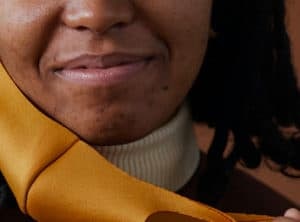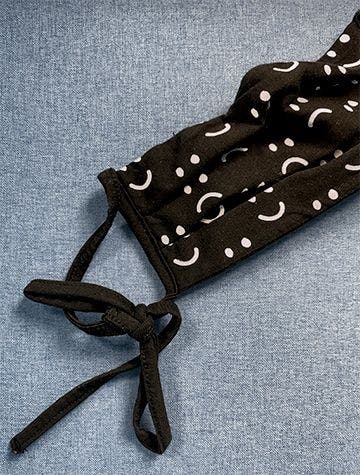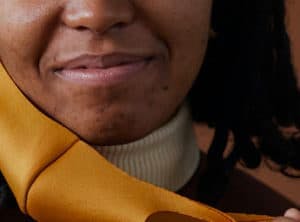Increase In Severity Of Acne And Rosacea From Face Masks

Face coverings have quite rightly been everyone’s most important accessory since Summer 2020. This has, however, led to an increase in severity of acne and rosacea from face masks, according to new research.
Increase in mask-related acne and rosacea
A small, multi-centre lockdown study published in the Dermatologic Therapy journal reported patients experiencing acne or rosacea flares due to wearing face masks.

The study cohort included both men and women with median ages of 34 years (acne) and 48 years (rosacea). They each wore a face mask for approximately 8 hours per day. After six weeks, all participants were observed to have experienced an increase in mask-related acne or rosacea. Sex, age and time spent wearing a mask were found to have little effect on the outcome.
Clearly, as face coverings are essential in preventing the spread of COVID-19, it was – and remains – imperative to wear one when required. As such, the research team – which included members from Italy, America, Canada and Germany – advised an increase in patients presenting for treatment of “maskne” and “mask rosacea” was highly likely.
They concluded that large-scale studies into mask-related dermatoses and guidelines for the diagnosis and management of these conditions, is necessary. Recommendations for the “best therapeutic approaches” and ways to “counteract the pro‐inflammatory effect of masks” would also be welcomed.
Mask-wearing is likely to decline as we head towards Summer 2021 and more people of all age groups become vaccinated. Until then – and for an overlapping period – skin specialists should prepare to see more cases of maskne, mask rosacea and worsened cases of existing acne and rosacea.
As separate 2020 research into the pandemic and skin shows, healthcare workers who wear PPE may be among the most affected.
What is maskne and mask rosacea?
Essentially, “maskne” is a new COVID-19-related term that emerged during 2020 to refer to spots that develop on the lower face following the wearing of face coverings. This is, however, a colloquialism and not a medical definition. Similarly, “mask rosacea” is defined as rosacea that has developed under the same circumstances.
The above study authors provided the following explanation: “Maskne is a recognised subtype of acne mechanica, and mask rosacea is a potential new entity triggered by mask‐wearing during the pandemic.”
Previous research entitled The “Maskne” microbiome – pathophysiology and therapeutics by Dr Wan‐Lin Teo, was quoted in the aforementioned lockdown study. His original report further details what the term “maskne” means from a medical standpoint.
“It refers to a subset of acne mechanica, deserving consideration in view of widespread reusable fabric mask‐wearing to control the pandemic worldwide,” notes Dr Teo.
“Understanding of underlying pathophysiology directly relates to the novel skin microenvironment and textile–skin friction created by mask‐wearing, distinct from nontextile‐related acne mechanica previously linked to wearing of headgear. Specifically, the occlusive microenvironment leads to microbiome dysbiosis, which is linked to various dermatological conditions.” Continues below.

These conditions were listed as “sweat/heat‐related dermatoses”, “pressure‐induced dermatoses”, “increased skin irritation potential of conventional acne treatments under occlusion, exacerbation of chronic dermatoses, that is, perioral dermatitis, rosacea, and eczema, and susceptibility of these same patient groups to heightened discomfort with mask‐wearing.”
Dr Teo felt that maskne should be diagnosed when de novo acne presents six weeks after regularly wearing a face mask. Alternatively, it can also apply when existing cases of acne in the lower face and/or jawline increase in severity following the consistent use of a face covering.
This information was published in the International Journal of Dermatology in February 2021.
Treating acne and rosacea
There is currently no cure for either acne or rosacea, there are, however, a range of successful management solutions. These range from advanced skincare and prescription only medication (POM) to cosmetic dermatology options.
Common topical treatments for acne include:
- benzoyl peroxide (over the counter)
- azelaic acid (available over the counter or, for higher strengths, on prescription)
- retinoids such as tretinoin or adapalene (POM)
- antibiotics such as clindamycin or erythromycin (POM)
- superficial or light chemical peels using low concentration alpha hydroxy acids (AHAs) or beta hydroxy acids (BHAs), such as glycolic acid and salicylic acid
- photodynamic therapy, also known as UV light therapy.
Oral acne medication, including erythromycin, oxytetracycline and isotretinoin, is also available on prescription in suitable moderate to severe cases.
Common topical treatments for rosacea include:
- Dermalex Rosacea (over the counter)
- azelaic acid (POM strength is generally recommended depending on the severity)
- antibiotic creams or gels, such as metronidazole or erythromycin (POM)
- ivermectin (POM)
- brimonidine tartrate (POM)
- intense pulsed light (IPL) therapy
- superficial or light chemical peels featuring low concentrations of the glycolic acid, trichloroacetic acid (TCA) or salicylic acid.
Oral prescription medications for rosacea include oxytetracycline and doxycycline.
In cases of rosacea it is important to also identify any triggers the patient may have in addition to wearing a face mask. These typically include alcohol, caffeine, spicy foods, cheese and aerobic exercise.
With these conditions expected to rise among patients – not to mention the general increasing demand for treatments such as microneedling – now is a good time for injectors to strengthen their offering by adding in key cosmetic dermatology skills.
We believe cosmetic dermatology courses are definitely worth investing in for those trying to develop a fully-rounded aesthetics practice. There are even eLearning modules you can get stuck into at home, to give you a head start before lockdown ends in England and hands-on training can resume.
Addressing common dermatological conditions often requires a course of treatment. As such, it can provide a great opportunity for you to offer these services to affected injectables patients and to enhance your relationship with them. Building trust, along with efficient, effective and ethical treatment, can earn you a long-term client and valuable word-of-mouth recommendations.
For those who do not offer skincare or cosmetic dermatology services, it can be beneficial to partner with a peer who does. Ask your professional network for advice and trusted recommendations. Not only is being able to solve your patient’s problem by giving them a referral an example of excellent customer service, you might also earn commission if they go ahead with treatment!
All information correct at the time of publication
Download our full prospectus
Browse all our injectables, dermal fillers and cosmetic dermatology courses in one document
By submitting this form, you agree to receive marketing about our products, events, promotions and exclusive content. Consent is not a condition of purchase, and no purchase is necessary. Message frequency varies. View our Privacy Policy and Terms & Conditions
Attend our FREE open evening
If you're not sure which course is right for you, let us help
Join us online or in-person at our free open evening to learn more
Our Partners














STAY INFORMED
Sign up to receive industry news, careers advice, special offers and information on Harley Academy courses and services

